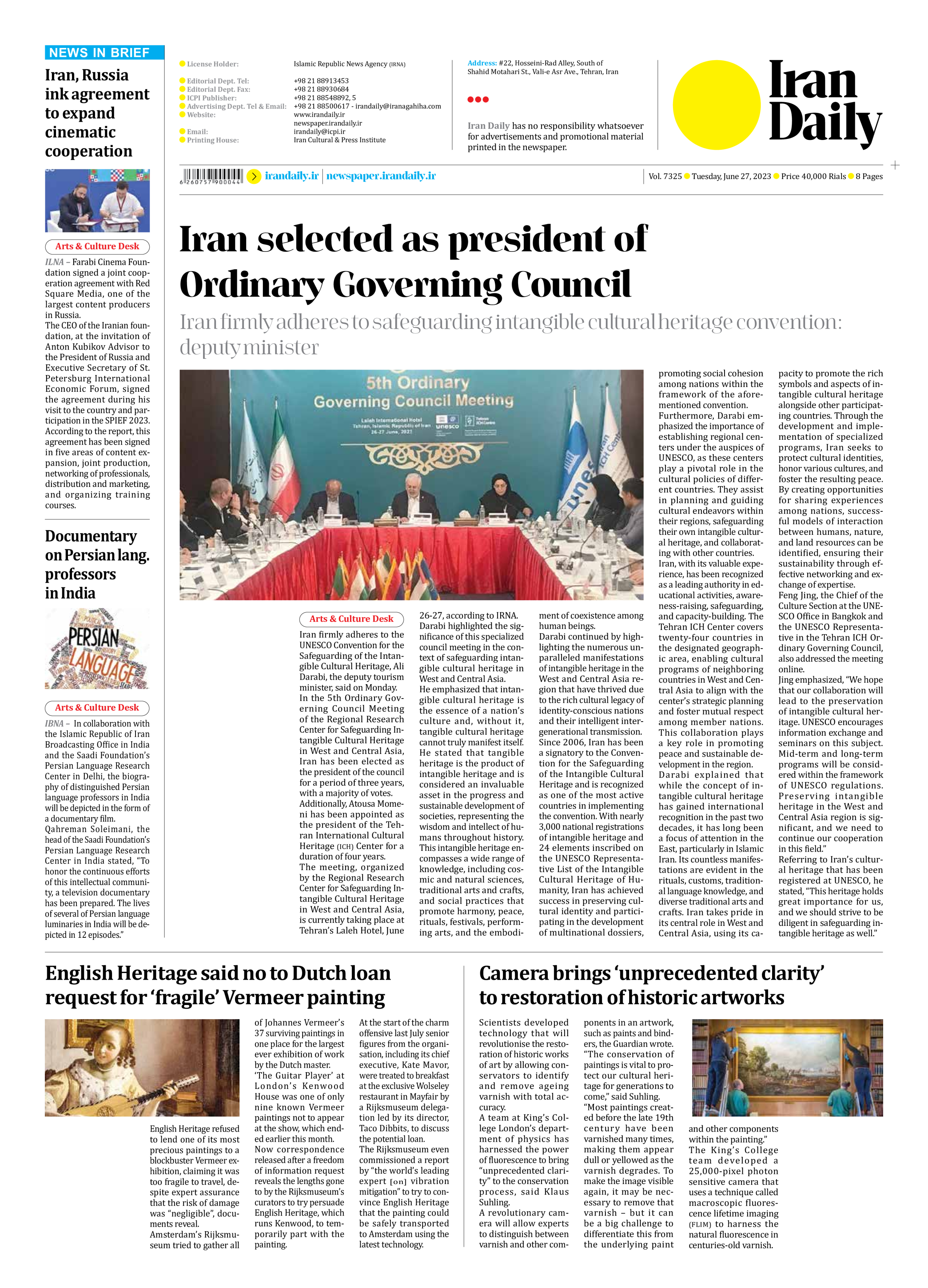
Iran selected as president of Ordinary Governing Council
Iran firmly adheres to safeguarding intangible cultural heritage convention: deputy minister
Iran firmly adheres to the UNESCO Convention for the Safeguarding of the Intangible Cultural Heritage, Ali Darabi, the deputy tourism minister, said on Monday.
In the 5th Ordinary Governing Council Meeting of the Regional Research Center for Safeguarding Intangible Cultural Heritage in West and Central Asia, Iran has been elected as the president of the council for a period of three years, with a majority of votes.
Additionally, Atousa Momeni has been appointed as the president of the Tehran International Cultural Heritage (ICH) Center for a duration of four years.
The meeting, organized by the Regional Research Center for Safeguarding Intangible Cultural Heritage in West and Central Asia, is currently taking place at Tehran’s Laleh Hotel, June 26-27, according to IRNA.
Darabi highlighted the significance of this specialized council meeting in the context of safeguarding intangible cultural heritage in West and Central Asia.
He emphasized that intangible cultural heritage is the essence of a nation’s culture and, without it, tangible cultural heritage cannot truly manifest itself.
He stated that tangible heritage is the product of intangible heritage and is considered an invaluable asset in the progress and sustainable development of societies, representing the wisdom and intellect of humans throughout history. This intangible heritage encompasses a wide range of knowledge, including cosmic and natural sciences, traditional arts and crafts, and social practices that promote harmony, peace, rituals, festivals, performing arts, and the embodiment of coexistence among human beings.
Darabi continued by highlighting the numerous unparalleled manifestations of intangible heritage in the West and Central Asia region that have thrived due to the rich cultural legacy of identity-conscious nations and their intelligent intergenerational transmission.
Since 2006, Iran has been a signatory to the Convention for the Safeguarding of the Intangible Cultural Heritage and is recognized as one of the most active countries in implementing the convention. With nearly 3,000 national registrations of intangible heritage and 24 elements inscribed on the UNESCO Representative List of the Intangible Cultural Heritage of Humanity, Iran has achieved success in preserving cultural identity and participating in the development of multinational dossiers, promoting social cohesion among nations within the framework of the aforementioned convention.
Furthermore, Darabi emphasized the importance of establishing regional centers under the auspices of UNESCO, as these centers play a pivotal role in the cultural policies of different countries. They assist in planning and guiding cultural endeavors within their regions, safeguarding their own intangible cultural heritage, and collaborating with other countries.
Iran, with its valuable experience, has been recognized as a leading authority in educational activities, awareness-raising, safeguarding, and capacity-building. The Tehran ICH Center covers twenty-four countries in the designated geographic area, enabling cultural programs of neighboring countries in West and Central Asia to align with the center’s strategic planning and foster mutual respect among member nations. This collaboration plays a key role in promoting peace and sustainable development in the region.
Darabi explained that while the concept of intangible cultural heritage has gained international recognition in the past two decades, it has long been a focus of attention in the East, particularly in Islamic Iran. Its countless manifestations are evident in the rituals, customs, traditional language knowledge, and diverse traditional arts and crafts. Iran takes pride in its central role in West and Central Asia, using its capacity to promote the rich symbols and aspects of intangible cultural heritage alongside other participating countries. Through the development and implementation of specialized programs, Iran seeks to protect cultural identities, honor various cultures, and foster the resulting peace. By creating opportunities for sharing experiences among nations, successful models of interaction between humans, nature, and land resources can be identified, ensuring their sustainability through effective networking and exchange of expertise.
Feng Jing, the Chief of the Culture Section at the UNESCO Office in Bangkok and the UNESCO Representative in the Tehran ICH Ordinary Governing Council, also addressed the meeting online.
Jing emphasized, “We hope that our collaboration will lead to the preservation of intangible cultural heritage. UNESCO encourages information exchange and seminars on this subject. Mid-term and long-term programs will be considered within the framework of UNESCO regulations. Preserving intangible heritage in the West and Central Asia region is significant, and we need to continue our cooperation in this field.”
Referring to Iran’s cultural heritage that has been registered at UNESCO, he stated, “This heritage holds great importance for us, and we should strive to be diligent in safeguarding intangible heritage as well.”







